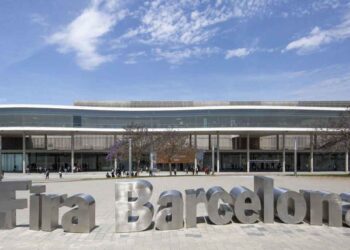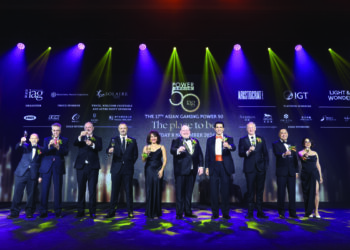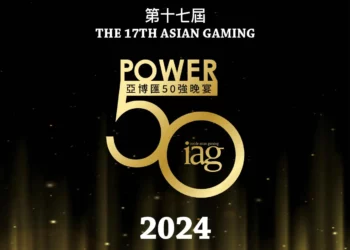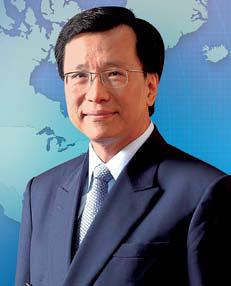 1 (4) Lim Kok Thay
1 (4) Lim Kok Thay
Chairman and CEO, Genting Berhad
Lim Kok Thay may seem to some a surprise choice for top position in this year’s Asian Gaming 50 – 2009, especially because he knocks ‘Mr Macau’, Dr Stanley Ho, off pole position.
On closer inspection, Mr Lim’s rise isn’t so surprising. In a world where casino operators are cutting budgets and in some cases struggling to make debt payments, Mr Lim’s company, Genting Berhad, is not only holding its own but is growing.
The Genting group operates Malaysia’s only casino, Casino de Genting at the Genting Highlands Resort, the world’s largest single resort, which includes over 10,000 hotel rooms within a complete entertainment city. It also controls Star Cruises, Asia’s leading and the world’s third biggest cruise line.
Last month, on 28th August, Star Cruises, in partnership with Philippine billionaire Andrew Tan, unveiled the US$700 million Resorts World Manila at Newport City near Manila’s international airport. It is stocked with an initial 100 gaming tables, set to increase to 300 tables and more than 1,000 slot machines by the end of the year. Even with its opening complement of 100 tables, Resorts World Manila already ranks as the Philippines’ largest casino.
The real centrepiece of Genting’s international gaming operations, however, will be a S$6 billion (US$4 billion) integrated resort located on Singapore’s resort island of Sentosa, scheduled for an early 2010 opening. Industry whispers suggest the property could even be ready before Christmas 2009. Investment bank CLSA forecasts Resorts World at Sentosa will garner a 46% share of an estimated US$3.2 billion national market in casino revenue in Singapore in 2010.
That’s not the only bright spot on the horizon. Genting, in common with many other Asia-based gaming and non-gaming companies, has managed to keep its financial gearing modest, arguably putting it in a better position to take advantage of the economic recovery when it comes. In late July this year, the Group announced two share buybacks. They were for relatively modest amounts (just under US$5 million), but at a time when some rival foreign casino operators are issuing new shares like there’s no tomorrow, it provides some positive news for Genting’s existing equity investors.
Genting recently took a 3.2% stake in the Macau and Las Vegas operator MGM MIRAGE for US$100 million. Genting was at pains to point out the purchase related to a valuation opportunity presented by MGM MIRAGE’s under-pressure shares. Speculation had suggested Genting harboured a strategic aim to become partners with an existing operator in Macau. This speculation was stoked by the fact that Genting subsidiary Star Cruises had previously expressed interest in a partnership with Dr Stanley Ho in a casino project in Macau, although that idea faded after reports it might cause difficulties for the parent Genting in its relationship with the Singapore regulators.
‘Coherence’ is a word that has been used by some analysts to describe Genting Group’s activities. The achievement of a coherent strategy would be no mean feat, given that the conglomerate has activities ranging from gaming to power generation, plantation farming, property and oil and gas. What analysts suggest is that rather than operating its diverse activities discretely, Genting has managed to create synergies whereby those activities and their revenue streams support each other and the business as a whole.
Genting was named ‘No. 1 in Overall Most Convincing & Coherent Strategy In Malaysia’ in Euromoney’s ‘Asia’s Best Managed Companies 2009’ awards. The company was also voted ‘No.2 in Top Ten Most Valuable Malaysian Brands’ in Brand Finance Plc’s ‘Malaysia’s Top 50 Brands 2008’ awards.
An example of Genting’s strategic approach is the way the company has positioned Genting Highlands Resort in its home market of Malaysia in anticipation of its new resort in Singapore. Mr Lim ordered a major refurbishment of Genting Highlands Resort, commencing in 2007. This wasn’t rocket science, given that the existing resort was starting to look a bit dated in the light of developments in Macau and elsewhere. Nonetheless, Genting’s understanding of the need for a modern marketing strategy and cross-promotion enabled the company to redefine its Genting Highlands facility as a hilltop resort with some gaming, rather than a hilltop casino with some entertainment. This approach has helped to familiarise Genting’s casino customers with the integrated resort concept well in advance of RWS’s opening. It brought immediate results, with the annual number of visitors to Genting Highlands peaking at almost 20 million.
RWS in Singapore will feature not only a casino but a Universal Studios theme park and animation studio, six hotels, the world’s largest marine park, meeting facilities, shops, and a 1,600-seat theatre.
Elsewhere, Genting has been careful not to over-extend its gaming ambitions. Plans formulated last year for a casino resort and Universal Studios theme park at Manila Bay in The Philippines faded in 2009. Privately, Genting executives denied that a formal deal had ever been on the table.
As we reported last year, Under Mr Lim’s watch, Genting has expanded its overseas interests. Since his appointment as Genting’s president and chief executive in November 2002, and later as chairman in December 2003, Mr Lim has overseen Genting’s acquisition of Britain’s Maxims Casino Club, an exclusive high-end casino, and raised its stake in London Clubs International, which operates casinos in London, Egypt, South Africa and Lebanon. Through its Genting Stanley (formerly Stanley Leisure) subsidiary, Genting is now effectively the largest casino operator in the UK, according to the company. Mr Lim also drove casino developments for Genting in Australia (Burswood and Adelaide casinos) and brokered a partnership to operate Subic Bay Resort and Casino in the Philippines.
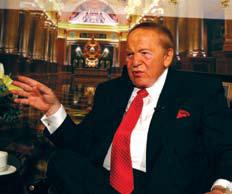 2 (2) Sheldon Adelson
2 (2) Sheldon Adelson
Chairman and CEO, Las Vegas Sands Corp.
What a difference a year makes. Like Icarus, the boy in Greek mythology that flew a little too close to the sun, Mr Adelson saw the wings of his business, Las Vegas Sands Corp., lose an alarming number of feathers in a short space of time. Unlike Icarus, Mr Adelson has been able to keep himself airborne.
Not only has Mr Adelson stayed aloft, he has also presided over what amounts to a clearout of executives at the very top level of his organisation—including the high profile departure of Bill Weidner as President and Chief Operating Officer. Now, according to analysts, LVS, along with Las Vegas rival Wynn Resorts, could be poised to raise extra cash on the Hong Kong stock market with an initial public offering of shares in a local unit spun off from the parent—taking advantage of an upward bounce in Asian equity prices.
It’s certainly a turnaround from the final quarter of 2008. Then, in the aftermath of the global credit squeeze, the capitalisation of Mr Adelson’s casino operating business plummeted earthward before recovering and recommencing its upward trajectory. Nevertheless, the fallout from the global panic proved costly. By August this year, LVS stock held only 11% of the value it registered at the beginning of 2008. At the same time, LVS’s debt burden—run up as part of an aggressive expansion programme—was only partly offset by the mothballing of some building work on Cotai. Mr Adelson was not alone in his discomfort. He had plenty of company both inside the Asian gaming sector and beyond. Where Mr Adelson was under more specific pressure was in the warning from his auditors, filed in November with the US Securities & Exchange Commission, that there was some question mark about LVS’s viability as a going concern. That related to whether LVS could meet its debt covenants under the new, tougher trading conditions.
While the SEC filing generated a lot of negative publicity for LVS, it shouldn’t be forgotten that in a post-Enron world, US standards on financial disclosure remain some of the toughest in the world. This means US auditors are required to cry wolf earlier and more often than in almost any other jurisdiction in the world.
The fact that Mr Adelson remains in second place on our list indicates the question posed by auditors has been answered—at least for the time being. Despite his company’s significant debt burden, his casino operations continue to generate greater annual EBITDA than almost any other gaming company in the world.
LVS did experience a slight setback in July when it had to concede that Marina Bay Sands, its integrated resort in Singapore, would not open before the end of 2009 as it had hoped. The company is confident, though, that once open early next year, MBS will supply 40% of LVS’s global annual EBITDA by 2011—which the company has estimated will amount to US$700 million in cash terms.
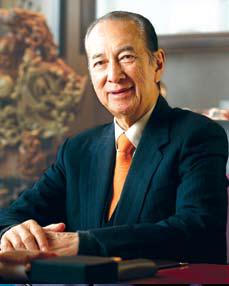 3 (1) Stanley Ho Hung-sun
3 (1) Stanley Ho Hung-sun
Chairman and Managing Director, Sociedade de Jogos de Macau (SJM)
Dr Stanley Ho is the founder not simply of the modern gaming industry in Macau, but also of Macau as a world-ranked tourism destination. In recognition of his achievements, he was presented with a G2E Asia Visionary Award on the first day of G2E Asia 2009, held in June at the CotaiExpo™ convention centre.
Dr Ho made his first fortune—outside gaming—before Steve Wynn, number 4 on this year’s list, was even born. Dr Ho also has nearly half a century of experience in serving Macau’s predominantly Chinese gamblers. While that may give him an edge in terms of anticipating the needs and direction of the market, Dr Ho’s advanced age is likely to be an increasingly important factor when it comes to the future of his company.
Macau’s most famous entrepreneur will celebrate his 88th birthday in November. He must naturally have given some thought to how his businesses—in particular his casino operating company, Sociedade de Jogos de Macau (SJM) and his general Macau investment vehicle, Sociedade de Turismo e Diversões de Macau (STDM)—will be run after he leaves the stage.
The market is likely to focus increasingly on succession issues, given that Dr Ho recently underwent surgery at Hong Kong Adventist Hospital and spent time in intensive care there after reportedly tripping and hurting his head at home. The news sent shares in SJM Holdings, the Hong Kong-listed arm of Dr Ho’s casino empire, falling by as much as 5.5% on the day.
Nonetheless, any company led by Dr Ho arguably retains a significant competitive edge against the foreign competition. This is in terms of depth of local contacts, the standing he personally has in government circles and his ability to understand their way of thinking, as well as his ability to think and negotiate strategically so that his business interests extract maximum advantage from the regulatory and political framework of Macau.
His insight about the local market paid off in spades in the months before and after the recent global credit crisis. His decision to limit capital expenditure on new infrastructure, to control business overheads aggressively and to focus on effective cross marketing of his properties in an aggressively bullish market at a time when some of his rivals were leveraging themselves to the hilt, proved to be a far sighted and highly resilient business formula. It allowed him to spread his bets and extend his brand coverage across the Macau peninsula—the traditional heartland of the Macau casino industry—at modest, incremental cost with projects such as L’Arc (due to open in September 2009) and Oceanus. Thus far, the strategy has meant that Dr Ho’s casinos managed not only to hold on to last year’s market share based on gross gaming revenues, but also actually to build on it.
The alternative market strategy—putting nearly all one’s investment eggs in one capital-intensive integrated resort basket—as occurred with Las Vegas Sands Corp, led by the person ranked number two on this list, has proven to be a little more challenging in the current straitened credit markets.
Dr Ho also deserves a nod as the pioneer of Macau’s unique VIP market structure—involving operators of private VIP rooms and the rolling chip commission programme—that continues to generate the bulk of casino revenue in Macau and virtually all of Asia.
Starting in the mid-1980s, the VIP rooms located within Dr Ho’s casinos took on some of the administrative burden of the gaming operations in exchange for a share of revenue. Meanwhile, junkets received a commission on the purchase of ‘non-negotiable’ or ‘dead’ chips by the players they brought in. The commission serves not only as a reward to junkets for bringing their clients to a particular casino, but also for extending credit to those clients, since the bulk of VIP gamblers in Macau come from mainland China and are unable to bring large sums of money with them owing to China’s currency controls. In addition, gambling debts are not legally enforceable in China, so the junkets are also charged with the sometimes onerous task of collection.
Each successive foreign operator arriving in Macau proclaimed it would court high-rollers directly and do away with the junket middle men (and therefore not contribute to escalating junket commission rates). Each, however, quickly realised that junkets are crucial to operating a high-roller business in Macau, and adopted the familiar arrangements created by Dr Ho.
For the time being, Dr Ho’s grasp of strategic issues in the Macau market remains unparalleled. It was Dr Ho who was one of the driving forces in the creation this year of a trade association for Macau operators. His aim was to reduce financial pressure on the operators during a global recession by eliminating irrational or excessive competition among them. The arrangement was formally recognised in July with a signing ceremony at Dr Ho’s flagship Grand Lisboa property.
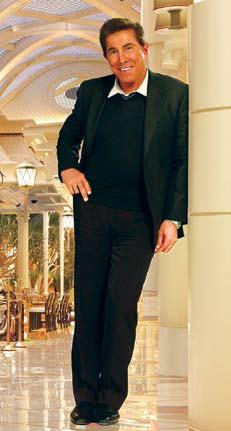 4 (3) Steve Wynn
4 (3) Steve Wynn
Chairman and CEO, Wynn Resorts
Steve Wynn was the least bullish in terms of spending commitments of all the foreign-owned casino companies in Macau. A consequence is that his company appears to the least financially-stressed of all the foreign outfits in that market and at home during the current downturn.
Not only has he managed to fund Encore Macau—the VIP-focused extension to his sole Asian property, Wynn Macau—at a modest capex, but he has also managed to position the company for an initial public offering (IPO) that could raise as much as US$2 billion once conditions are deemed favourable.
In July, Wynn Resorts announced one of its subsidiaries had filed an application with the Hong Kong Stock Exchange Ltd in connection with a possible listing on the exchange. It added at that time that no decision had yet been taken regarding the timing or terms of any IPO, though sources familiar with listing procedures in Hong Kong said it normally takes three months to process an application.
Steve Wynn’s influence on Macau extends well beyond the walls of Wynn Macau, right up to the front door of his industry rival Sheldon Adelson’s Venetian Macao property. Mr Adelson may dispute the idea that Mr Wynn was an influence. But it’s a matter of record that it was Mr Wynn, back in the 1980s, who first had the bright idea of creating a casino resort on the Las Vegas Strip that placed as much importance on dining and entertainment as on gaming. The result was the Mirage. It was this pioneering of the integrated resort concept that is also credited with having secured Mr Wynn a Macau casino concession. It’s fair to say that Mr Adelson, with his background in trade exhibitions, enhanced and refined Mr Wynn’s concept in Las Vegas by developing conference facilities at gaming resorts to ensure hotel rooms remained full all year round. Mr Adelson then exported this concept to Macau, and The Venetian Macao was born.
Mr Wynn showed considerable acumen in the Macau market by converting a sub licence granted to him into a cool and virtually cost-free US$900 million profit. Why he had the sub licence in the first place is almost worth an Asian Gaming 50 entry of its own. The concise version: only three concessions were awarded, but following Las Vegas Sands Corp’s split with its original bidding partner, Galaxy, each concession holder was awarded a sub-concession in order to allow LVS and Galaxy to go their separate ways without re-opening the bidding process. Stanley Ho sold his sub-concession to the joint venture involving his daughter Pansy and MGM MIRAGE for US$200 million. Mr Wynn, meanwhile, sold his sub-concession to the Melco Crown joint venture in April 2006 at a price that covered three quarters of the initial US$1.2 billion cost of Wynn Macau, which had its first phase opening in September 2006.
Mr Wynn is known for his ferocious energy. He needed it recently when he made a 28-hour round trip to Wynn Macau just to attend a wedding reception for Jonathan Zeman, son of Wynn shareholder and director Allan Zeman. He didn’t even have time to stay the night, but as a showman like Mr Wynn understands, courtesy and appearances count.
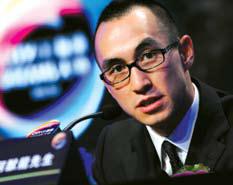 5 (6) Lawrence Ho Yau-lung
5 (6) Lawrence Ho Yau-lung
Co-Chairman and CEO, Melco Crown Entertainment
Lawrence Ho’s apprenticeship in the Asian gaming industry has been fully served and Dr Stanley Ho’s son is now ready for the next phase—executive maturity. That certainly seems to be on the agenda following the opening of City of Dreams by Mr Ho junior’s joint venture with James Packer’s Australia-based casino company Crown Ltd, known as Melco Crown Entertainment Ltd (MPEL) and listed on Nasdaq in New York.
City of Dreams, located opposite Venetian Macao on Cotai, has the potential to take Mr Ho and his partner into Macau’s big league. Prior to its launch on 1st June, MPEL’s mass market coverage was limited to Mocha Clubs, the slot machine clubs away from the territory’s casino hot spots and drawing mainly local players. Most of MPEL’s revenues were coming from the VIP-focused Altira Macau (formerly known as Crown Macau) on Taipa, and that property’s success was founded on the market-leading 1.35% commission rate on rolling chip volume offered to betting agents in order to get them to bring their high roller customers in the doors, up in the lifts and out to the VIP gaming suites. Now that the industry (with some prodding from the government) has agreed in principle to a 1.25% cap on the VIP commission rate, Altira’s competitive advantage has effectively been cancelled out.
Mr Ho’s first executive role in the gaming industry was as managing director of Hong Kong-listed Melco under the chairmanship of his father. Prior to joining Melco, Mr Ho worked at the merchant bank Jardine Fleming from September 1999 to October 2000 and iAsia Technology Ltd (the predecessor of Value Convergence Holdings Ltd).
Melco was a long-established company with a relatively low profile before Mr Ho took over. He used it as a vehicle to transform Macau’s local slot club market. Mocha, a Ho-family business unit operating slot machine clubs aimed mainly at local players, was rapidly developed into the more contemporary and marketing-focused organisation branded as Mocha Clubs. The relaunch involved an extensive refurbishment programme of the company’s existing properties and the addition of some new ones, and the creation of Macau’s first VIP slot lounges and main floors stocked with high performing product. The local slot players at Mocha clubs are a distinctively different clientele from the slot players coming from Hong Kong and Mainland China that populate the casinos’ main floors. Mocha showed that careful selection of slot product, attractive surroundings, effective marketing and enthusiastic leadership gave the lie to the notion that ethnic Chinese players either didn’t like slots or didn’t trust them.
A question for the future is whether Lawrence Ho will play any kind of role in running STDM and SJM when his father leaves the stage, or whether the assets of his father’s company could be divested and absorbed into the gaming operations of Lawrence Ho and his sister Pansy.
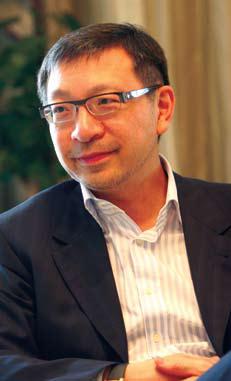 6 (5) Francis Lui
6 (5) Francis Lui
Deputy Chairman, Galaxy Entertainment Group
Francis Lui took a momentous decision earlier this year when he decided to put Galaxy’s nearly-finished integrated resort on Cotai into what amounts to suspended animation. He cited the need for caution until market conditions were shown to be right. That, in part, accounts for him slipping one place from fifth to sixth in this year’s Asian Gaming 50 – 2009 list. Mr Lui could reasonably argue he doesn’t care where he sits in any list, provided he offers consistent and improving value for shareholders and uses his investors’ money wisely.
The company faced a dilemma familiar to rapidly expanding industries. This was whether to conserve cash to service existing debt on venues already opened, or whether to press on with launching new venues. The latter judgement required faith that there was enough liquidity in the Macau casino industry to service the start up costs of the new venue. Mr Lui and his executives were not convinced that Macau—despite its significant revenue growth even in the second half of 2008—currently has the necessary ‘legs’ to support a strategy of aggressive expansion of supply. In reaching their decision, Mr Lui and his executive team took into account the global credit crisis and the knock on effect it appears to have had on China’s exporting industries and the credit rating of Chinese VIP gamblers.
In the end, Mr Lui and his team opted for what might be seen as a classically Chinese piece of pragmatism. This was to continue building the company’s Cotai resort but to stop short of fitting it out, while at the same time reducing overall corporate debt by making cash-hungry bond holders an offer they found hard to refuse.
Delaying the interior fit out of the property until the eve of its launch certainly makes sense. That’s in terms of the potential for cost savings by beating down suppliers on price in a distressed market. It also makes sense because of Macau’s notoriously humid sub tropical climate, which can render any unoccupied, non air-conditioned property mould-ridden within weeks.
Time will tell if the decision to delay opening Galaxy’s Cotai resort was prudent and far sighted, or a missed opportunity.
Galaxy is an interesting animal compared to the other five concessionaires and sub-concessionaires in Macau. The Lui family-run core company, K. Wah Construction Materials, had no direct involvement in the gaming industry prior to liberalisation of the Macau market in 2002. This is not necessarily a disadvantage. Not only did Galaxy hire experienced gaming industry people to help guide it, but family members, including Mr Lui, showed themselves willing to question received wisdom within the industry, with a focus always on fiscal caution. Evidence of this was when Galaxy decided to follow a bond issuing route to debt finance in 2005-06, at a time when banks were lining up to throw loan money at the Asian gaming sector.
Galaxy’s position appeared to be vindicated earlier this year when the company was able to ‘retire’ US$170 million of bond debt by offering cash to liquidity-seeking bond holders, at a cost to Galaxy of only US$86 million—in effect a 50% discount. This happened at a time when some of Galaxy’s market rivals were stuck with covenants on bank loan debt, providing in some cases punitive penalty clauses for early payback. That, in effect, is an inevitable by-product of a system where banks borrow short at high rates and lend long.
Mr Lui showed himself to be a pragmatist and also an opportunist (in the best sense), when the newly constituted Galaxy Entertainment Group made a quick entry into the Macau market by—beginning in 2004—opening a handful of casinos within hotels owned by other companies. These properties, branded City Clubs, are still operating within the Waldo, Rio, President and the Grand Waldo venues. But it was Galaxy’s flagship property, StarWorld Hotel and Casino, that really enabled the company to place its stamp on Macau’s gaming landscape. The award-winning property continues to punch above its weight, both in business performance terms and general consumer appeal, relative to the capital invested in it.
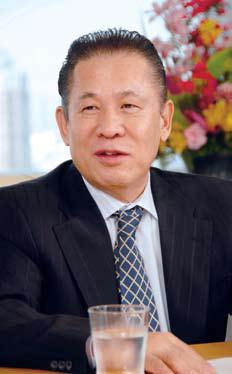 7 (9) Kazuo Okada
7 (9) Kazuo Okada
Chairman, Aruze Corp
Vice-Chairman, Wynn Resorts
As a result of the credit crisis and slumping sales of Aruze’s pachinko and pachislot machines in its home market of Japan, Kazuo Okada’s net worth declined to US$900 million at the start of 2009, according to the Forbes.com’s ‘Japan’s Richest’ list. So though he is no longer technically a self-made billionaire, he could soon regain that mantle following recent aggressive moves to establish Aruze as a leading international slot machine manufacturer, the bounce-back in value of Aruze’s 21.8% stake in Wynn Resorts and realisation of Mr Okada’s casino operating ambitions.
Mr Okada built his fortune on Aruze’s success in the Japanese pachinko and pachislot machine manufacturing markets. The gaming machines using steel balls are one of Japan’s most popular forms of entertainment and Aruze is the second largest manufacturer of them. Over the years, Aruze (formerly Universal Distributing) has expanded into the production of other electronic gaming machines, amusement machines and video games.
Early this year, Aruze Gaming acquired US gaming-machine content supplier True Blue Gaming, which is now tasked with developing content for all Aruze Gaming offices around the world. As part of the agreement, Aruze Gaming acquired the talents of Kent Young, formerly Global General Manager of Aristocrat Technologies, and game developer Scott Olive, who was responsible for creating some of Aristocrat’s most popular and innovative games. Aristocrat, of course, is the undisputed Asian slot market leader, though it could well lose some of its position to Aruze now that Messrs Young and Olive have joined the latter’s ranks.
The value of powerful friends in the gaming industry cannot be understated, and Kazuo Okada has discovered that a friend in need is a friend indeed. His friendship with Wynn Resorts’ Steve Wynn has opened many doors for Mr Okada’s Tokyo-listed gaming machine supplier Azure, but it has the potential to open a much bigger door for Mr Wynn when casinos are eventually legalised in Japan.
The pair’s business relationship began in 2000 when Steve Wynn was looking for new financial backers to open Wynn Las Vegas. Mr Okada answered his call with a substantial investment that netted Aruze the single largest stake in Wynn Resorts—although Steve and Elaine Wynn effectively own a larger overall share of Wynn Resorts through their stake in Aruze USA, it remains to be seen whether Aruze or Steve Wynn ends up with the largest stake once the Wynns’ divorce proceedings, begun in March this year, are finalised.
The business ‘marriage’ between Mr Okada and Mr Wynn may not have been made in heaven proper, but it certainly offered—and continues to offer—a harmonious resolution to both men’s needs. Mr Wynn and Mr Okada’s mutual interest in expanding their gaming assets and sales globally has seen them collaborate on a number of projects, including Wynn Macau. Since October 2002, Mr Okada has served as vice chairman on the Wynn Resorts board, affording him an even greater say on the company’s future direction.
Today, Aruze holds a manufacturer licence with the Nevada Gaming Commission (thanks in no small part to his friend Steve Wynn’s vocal support) and sells its machines in Macau, the US and Australia. In the company’s 39-year history, the Okada family has managed to retain ownership of a controlling share in Aruze, assuring Mr Okada also has the final say on his company’s future.
Aruze’s 24-player baccarat machines sit on the gaming floor at Wynn Macau, and Steve Wynn honoured Mr Okada and his family by naming Wynn Resorts’ Japanese restaurants Okada. Their friendship will truly have borne fruit if Wynn Resorts and Aruze successfully gain a licence to operate a property in Japan.
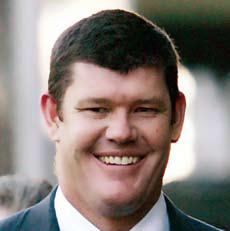 8 (8) James Packer
8 (8) James Packer
Chairman, Crown Ltd
Co-Chairman, Melco Crown Entertainment
The last 12 months have produced mixed fortunes for James Packer, the chairman of the Australia-based casino operator Crown Ltd and co-chairman of the Macau casino developer and operator Melco Crown International Ltd (Nasdaq: MPEL).
Starting with the good news, MPEL’s first integrated resort in Macau, City of Dreams, opened at the beginning of June this year. It puts Crown Ltd firmly on the map as a player in the East Asia gaming market.
On the not-so-good news front, some of Mr Packer’s North American casino investments—bought at the top of the market—performed poorly. For example, he experienced a US$290 million write down on Las Vegas-focused gaming company stocks, including a stake in Harrah’s. One bet Mr Packer was considering last year but is probably very glad in hindsight he didn’t make, was to build a Crown casino in Las Vegas. The US$5 billion scheme would have consisted of a 5,000-room hotel and a 324-metre tower, which would have made it the highest building in the city.
Mr Packer, the son of the late Australian media entrepreneur Kerry Packer, inherited US$5 billion in business interests after Mr Packer senior’s death in 2005. He then restructured the business, spinning off the media assets and placing his bets mainly on the gaming sector.
This time last year, Forbes estimated Mr Packer’s net worth at US$5.7 billion. This year, after a combination of a crash in global equity prices and write downs at Crown and Consolidated Media, Forbes put his net fortune at US$2.5 billion—a fall of 56%.
Following these setbacks, Mr Packer displayed elements of the ‘ordinary bloke’ community solidarity that characterises even Australia’s super rich. He put one of the toys traditionally associated with a billionaire lifestyle—namely his US$50 million yacht—up for sale. He also postponed delivery of a US$60 million private jet and left a swimming pool complex at his family property half-built.
The bigger they come, the harder they fall. Relative to the super rich around him, Mr Packer is holding his own. In May this year, he reclaimed the top spot on the ‘Australia’s 40 Richest’ list, also published by Forbes.
On the public relations front, Mr Packer is a less prominent figure in Macau than his joint venture partner Lawrence Ho of Melco International Development. The latter tends to front the organisation when it comes to media announcements and interviews. This is not to say Mr Packer takes no interest or leadership role in the business, but he does not appear to relish the razzamataz that goes with being a casino entrepreneur in the way that Sheldon Adelson or Steve Wynn does.
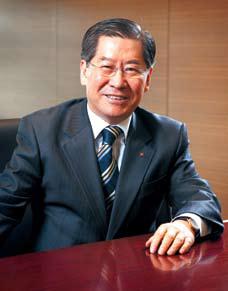 9 (-) Kwon Oh-nam
9 (-) Kwon Oh-nam
President and Chief Executive, Grand Korea Leisure
Mr Kwon plays an important role not only in running an important part of South Korea’s legal casino sector, but also in promoting a positive image of the industry to sometimes sceptical lawmakers.
Since his appointment as President and Chief Executive of Grand Korea Leisure (GKL) a year ago, he has succeeded in boosting the performance of the organisation’s three casinos, operated under the Seven Luck brand. In doing so he has bucked the global recessionary trend.
GKL, a subsidiary of the Korean Tourism Organization (KTO), was established in 2005. It is the only state-owned casino operator in South Korea, and is likely to be part privatised with a flotation on the country’s stock exchange in the second half of 2009. GKL plans to sell off a 49% share in the business between now and 2010 as part of the Korean government’s plan to raise cash from public assets and reduce public spending.
As the top boss at GKL, Mr Kwon has control of three of South Korea’s 17 licensed casinos. Two of GKL’s establishments are located in Seoul and one in Busan—all under the Seven Luck brand.
Since the venues opened in 2006, GKL has become the biggest single casino operator in South Korea by revenue, with an annual gross of US$284 million last year.
The most obvious hurdle to overcome for all Korean casino operators in building the national market is that only one of Korea’s 17 legal casino venues—Kangwon Land Resort & Casino in Jeongseon-gun—is open to locals. All the others are by law restricted to foreigners.
The 64-year-old Mr Kwon is well placed to act as a public relations face for the industry in the battle to relax that regulation. He has impeccable contacts within South Korea’s sometimes labyrinthine bureaucracy from his days at the Korea Trade Investment Promotion Agency (KOTRA). He held a variety of positions there, including heading the agency’s North American office.
“An important goal of mine is to help improve the perception of casinos among policymakers, politicians and the general public, making them aware that we are running a good and clean business that’s earning foreign money for the country at a difficult time,” Mr Kwon was quoted saying recently.
If South Korea is to compete with Singapore (which is due to open its first casino resort early in 2010) and possibly with Taiwan and Japan, which have both looked at legalisation of casinos, then the Korean industry must be allowed to have bigger venues with more services, such as holiday resort facilities or medical services, Mr Kwon has stated.
Since taking up his post in July 2008, Mr Kwon has travelled to several US locations including Hawaii, New York and Washington D.C.—communities with significant populations of ethnic Koreans and Japanese—to pitch a concept he calls the “business casino”. This is essentially a version of the Las Vegas integrated resort model, but scaled down and adapted for an East Asian clientele. As such, it includes the integration of gaming with business meetings, medical services and shopping.
GKL says visitors to the Seven Luck casino near COEX in southern Seoul will soon have the option of a health check-up at the private medical clinic located in the nearby Intercontinental Hotel, while the Busan Lotte Hotel outlet will soon have a health check-up centre.
Under Mr Kwon’s leadership, the performance of the Seven Luck venues in the first half of 2009 has bucked the recessionary trend seen in the wider Asia Pacific and global economies. After setting new highs in revenue with more than 43 billion Korean won (about US$31.8 million) in January, the venues broke previous attendance records for February, recording 105,000-plus visitors.
The 34.7 billion won revenue in March represented nearly 34% growth year-on-year, while the 100,000-plus visitors that month was up approximately 52% year on year.
The company said most of the growth in the first quarter of 2009 was due to a sharp rise in the number of Japanese visitors attracted by the weakness of the local currency, the won, against the Japanese yen. The three Seven Luck outlets combined to draw 56,977 Japanese visitors in March 2009, about 70% more than a year earlier.
GKL says that on current projections, it expects around one million visitors to its casinos this year, bringing in 400 billion won in revenue.
Mr Kwon has gone on record saying Seven Luck’s biggest strength is in providing resort-style services to cover the tastes of a whole family rather than lone gamblers.
GKL was also talking earlier this year of ramping up its slots offer in a market that, like Macau, has until now been dominated by table play. Recession permitting, it could provide some exciting opportunities for equipment suppliers during challenging times.
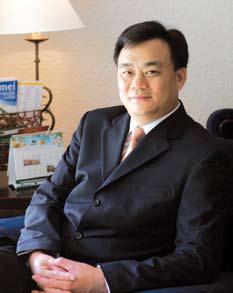 10 (25) Jack Lam Yin Lok
10 (25) Jack Lam Yin Lok
Chairman, Jimei Group
Prominent Asian gaming junket operator Dr Jack Lam moves up this year’s list thanks to the rapid growth of Jimei Group’s Macau operations since 2008. VIP play remains the lifeblood of Macau’s gaming turnover, with VIP revenue of 33.1 billion patacas (US$4.1 billion) in the first half of 2009 accounting for 64.4% of total casino revenue in the period.
Junket operators are essentially facilitators. They connect casino operators with high net worth players. Most importantly, they coordinate gambling credit for high rollers from Mainland China and other markets where restrictions apply on cross-border currency movements. They also ensure that those credit facilities are honoured by the players using them. As facilitators, junket operators must be strong negotiators with all the parties and have enough flexibility in their outlook to be able to adjust their business model to shifting market conditions. Dr Lam ticks all those boxes in terms of his approach to business.
In late 2008, Dr Lam also became a Macau casino operator in his own right, with the acquisition of a casino¬ at the former Mandarin Oriental Hotel (now the Grand Lapa Hotel) in downtown Macau.
The refurbished casino, relaunched under Jimei branding and operated under a sub-licence from Dr Stanley Ho’s casino operating company SJM Holdings, opened its doors to high rollers in January. The venue complements Jimei’s existing junket operations in Macau, the Philippines and further afield.
Jimei Group has expanded high roller operations quickly in Macau since 2008. It has opened the LeRoy VIP Club at SJM’s Grand Lisboa and the International Club at Wynn Macau, as well as VIP rooms at MGM Grand Macau, Sands Macao and The Venetian Macao.
Jimei Club at Melco Crown Entertainment Ltd’s City of Dreams opened in June 2009. The latest addition to the Jimei stable is the Jimei VIP Club at the Four Seasons Macau, which began operating in July 2009. Jimei’s market coverage makes it probably the biggest single supplier of VIP players in the Macau market. Jimei Group has also opened VIP service centres and travel offices in Taiwan and has similar plans for Singapore.
The company runs the casino cruise ship M.V. Jimei sailing out of Hong Kong. In addition, Jimei has interests in South Korea and the Philippines. Dr Lam became a junket operator in the Philippines in 1994. In 2000, he acquired Fort Ilocondia Resort & Casino and, in 2004, Fontana Leisure Parks & Casino. Both properties have enjoyed substantial growth in business under his leadership, offering a wide range of facilities including villas, water parks and hotels, as well as gaming.
Dr Lam was born in Mouming in Guangdong province, Mainland China, and moved to Hong Kong in 1979 at the age of 18. According to his official company biography, he started out as a bookkeeper at his uncle’s factory, earning only HK$1,000 (US$128) a month and sending most of his salary back home to help his family. He got his introduction to gaming through his uncle, who played regularly in Macau. After accompanying his uncle on several trips to Macau, Dr Lam built up a network of contacts and started working as a junket sub-agent—a ‘ground floor’ role that gave him insights into building and maintaining customer relationships.
In 1981, Dr Lam started work as a representative for a small junket in Macau. Thanks to what he describes as his attention to detail and a solid understanding of the market and of his clientele, he gradually emerged as a leading junket operator.
Expect to hear more about Jimei Group in Macau and beyond in the next 12 months, especially if the regional economy improves and China relaxes its restrictions on travel to Macau under the individual visit scheme.




















